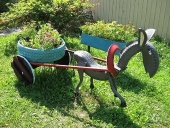
 4
4




 6
6




 2
2





"You may never know what results come of your action, but if you do nothing there will be no result”
How Permies.com Works
Be Nice
 5
5




soloenespana.wordpress.com






 3
3




 1
1




Matu Collins wrote:
I resist any urges to give children younger than teens screens of any kind to look at. No tv, no computer, no phone, no video games. Parents often think that the screen is giving then a break but in my observations it makes parenting harder. The children are over stimulated and less able to entertain themselves when the screens are off
 My kids are 100% able to entertain them selves when screens are off, and they have unlimited acess to screens. It is not that I think it makes parenting easier, or that I relaxes them, but that I know that they learn just as much from doing that as they do when they help me garden or from watching the dog. It also makes the time they spent helping me or playing outside voluntary and much more apprechiated by them.
My kids are 100% able to entertain them selves when screens are off, and they have unlimited acess to screens. It is not that I think it makes parenting easier, or that I relaxes them, but that I know that they learn just as much from doing that as they do when they help me garden or from watching the dog. It also makes the time they spent helping me or playing outside voluntary and much more apprechiated by them. 



"You may never know what results come of your action, but if you do nothing there will be no result”
How Permies.com Works
Be Nice
 2
2





soloenespana.wordpress.com






 1
1




 1
1




 2
2




soloenespana.wordpress.com
 1
1





soloenespana.wordpress.com
 2
2




"You may never know what results come of your action, but if you do nothing there will be no result”
How Permies.com Works
Be Nice
 2
2




 I raise them to act morally and with reason. If they chose not to steal or murder from fear of the law then I have failed as a parent. They should not even think of murdering and stealing, because it is immoral, and that lesson I cannot teach with punishment.
I raise them to act morally and with reason. If they chose not to steal or murder from fear of the law then I have failed as a parent. They should not even think of murdering and stealing, because it is immoral, and that lesson I cannot teach with punishment.
soloenespana.wordpress.com






 2
2




 3
3








Ellen Schwab wrote:I am very disturbed by a trend to remove all punishment from dog training and child rearing. JMO, but punishments and inconvenience and annoyances are all part of life and ~ JMO ~ but equiping our children to cope is a very important part of helping them be sane, productive members of society.
"You must be the change you want to see in the world." "First they ignore you, then they laugh at you, then they fight you, then you win." --Mahatma Gandhi
"Preach the Gospel always, and if necessary, use words." --Francis of Assisi.
"Family farms work when the whole family works the farm." -- Adam Klaus



















































Lisa Paulson wrote:Awe , my father was saddened to take me for a walk to see some mushrooms he was admiring and then finding them trampled, are you certain they will spore and generate more at any stage of development when trampled?
He would be relieved to know this but I would hate to tell him this and have him dissappointed . There is a child in all of us.
"You may never know what results come of your action, but if you do nothing there will be no result”
How Permies.com Works
Be Nice






 1
1

































 1
1




Iterations are fine, we don't have to be perfect
My 2nd Location:Florida HardinessZone:10 AHS:10 GDD:8500 Rainfall:2in/mth winter, 8in/mth summer, Soil:Sand pH8 Flat
 1
1




Children's Permaculture Guild (Founder, 2006)
Kurent: A Journal of Permaculture for Children, Parents, & Educators (Editor)






 1
1





“Enough is as good as a feast"
-Mary Poppins
 1
1




"You may never know what results come of your action, but if you do nothing there will be no result”
How Permies.com Works
Be Nice




 This kid isn't going to come crawling home when she's 25 because she's broke.
This kid isn't going to come crawling home when she's 25 because she's broke.
 1
1





 1
1




Paul Cereghino- Ecosystem Guild
Maritime Temperate Coniferous Rainforest - Mild Wet Winter, Dry Summer





Chris Badgett
Cocreator of Organic Life Guru. Have you seen what's happening over there?






 2
2




![Filename: 20140317_162151.jpg
Description: [Thumbnail for 20140317_162151.jpg]](/t/29274/a/15756/20140317_162151.jpg)
“Enough is as good as a feast"
-Mary Poppins




"We're all just walking each other home." -Ram Dass
"Be a lamp, or a lifeboat, or a ladder."-Rumi
"It's all one song!" -Neil Young

|
Look! I laid an egg! Why does it smell like that? Tiny ad, does this smell weird to you?
The new gardening playing cards kickstarter is now live!
https://www.kickstarter.com/projects/paulwheaton/garden-cards
|








